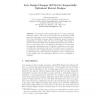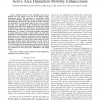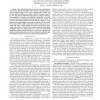4 search results - page 1 / 1 » Late Design Changes (ECOs) for Sequentially Optimized Estere... |
FMCAD
2004
Springer
13 years 10 months ago
2004
Springer
Late changes in silicon design (ECO) is a common although undesired practice. The need for ECO exists even in high-level design flows since bugs may occur in the specifications, ...
CODES
2008
IEEE
13 years 7 months ago
2008
IEEE
Synchronous languages like Esterel have been widely adopted for designing reactive systems in safety-critical domains such as avionics. Specifications written in Esterel are based...
TCAD
2010
12 years 12 months ago
2010
Starting from the 90nm technology node, process induced stress has played a key role in the design of highperformance devices. The emergence of source/drain silicon germanium (S/D ...
ASPDAC
2007
ACM
13 years 9 months ago
2007
ACM
In a realistic design flow, circuit and system optimizations must interact with physical aspects of the design. For example, improvements in timing and power may require replacing ...



